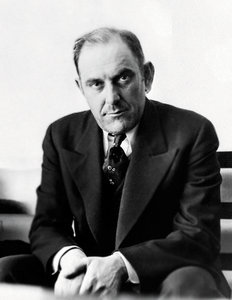
“Count” Victor Lustig was a man from Czechoslovakia who made himself quite a name as a con artist in Europe. Fleeing to America, where the heat was less intense and the police didn’t know him, he set his eye on a potential mark the likes of which would have made most other men cower in fear: the most ruthless and powerful gangster of the Prohibition Era.
According to author Robert Greene, Lustig approached Capone at his headquarters with an offer “he couldn’t pass up.” The offer was that, if Capone would entrust to Lustig the sum of $50,000 dollars, Lustig would double Capone’s money within sixty days.
Capone, who knew a crook when he saw one, nonetheless decided to try his luck with the dapper, well-mannered Lustig, who impressed with his obvious intelligence and class.
Lustig took Capone’s money eagerly, then deposited it in a safety deposit box for the requisite sixty days. He didn’t touch the money for the entire two months, made no “deals” to try and double the cash, and basically just waited out (on pins and needles maybe?) the two month time span. Then, going back to Capone, he hung his head in shame, and confessed, “I’m sorry. The deal fell through. It was all my fault, but I was unable to double your money.”
Capone glowered at the Czech confidence trickster, getting ready for one of his infamous psychotic outbursts, and to condemn Lustig to a watery sleep “with the fishes.” To the old gangster’s amazement, however, Lustig reached into his coat pocket and produced the huge wad of cash.
“Here’s your money. Every bit of it. Count it if you want!”
Capone was agog at the seeming “honesty” of this crook, He said (or so we are told); “By God, you are honest! I knew you were a crook from the moment you walked in here, but, look…if you need some money, here’s five g’s to get you by.”
And Capone handed him over five thousand dollars.
Lustig later claimed this is exactly what he EXPECTED to happen. Showing honesty to a man like Al Capone, he reasoned, would so touch the old monster he would be willing to part with a little because he was so thankful for not having lost, through treachery, a great deal more.
Later, when they were both serving time together at Alcatraz (where Lustig later died), the other cons were ordered to leave him alone. His protector? None other than his old benefactor, the notorious Alphonse Capone.
And the moral of this story is: Sometimes, a mere act of kindness or honesty applied at the right time, and the right place, to the right person, can reap tremendous dividends in the future.
(Source: The 48 Laws of Power by Robert Greene)
